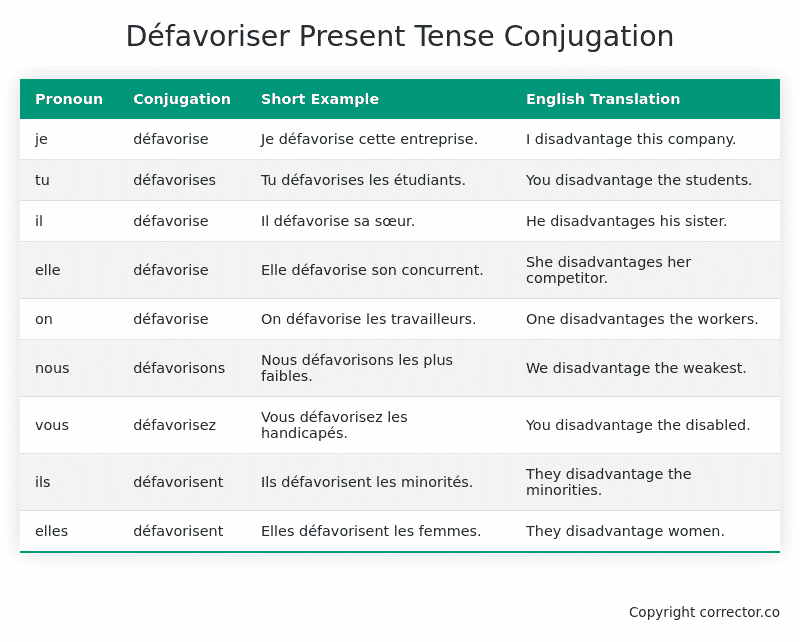Le Present (Present Tense) Conjugation of the French Verb défavoriser
Introduction to the verb défavoriser
The English translation of the French verb “défavoriser” is “to disadvantage” or “to put at a disadvantage.” The infinitive form “défavoriser” is pronounced as “day-fah-voh-ree-zay.”
The word “défavoriser” is derived from the combination of the prefix “dé-” (which can indicate negation or reversal) and the verb “favoriser” (meaning “to favor” or “to promote”). In everyday French, “défavoriser” is commonly used to describe actions or situations that cause someone or something to be at a disadvantage, to be treated unfairly, or to receive less favorable conditions compared to others.
Examples:
- Les mesures économiques risquent de défavoriser les petites entreprises. (The economic measures could disadvantage small businesses.)
- Les politiques de recrutement actuelles peuvent défavoriser certaines catégories de candidats. (The current recruitment policies may put certain categories of candidates at a disadvantage.)
- Les coupes budgétaires dans l’éducation risquent de défavoriser les élèves les plus vulnérables. (Budget cuts in education could disadvantage the most vulnerable students.)
Défavoriser – About the French Present Tense
To take a deep dive into all the French tenses then see our article on Mastering French Tense Conjugation.
Common Everyday Usage Patterns For Le Present
Interactions with Other Tenses
Table of the Present Tense Conjugation of défavoriser
| Pronoun | Conjugation | Short Example | English Translation |
|---|---|---|---|
| je | défavorise | Je défavorise cette entreprise. | I disadvantage this company. |
| tu | défavorises | Tu défavorises les étudiants. | You disadvantage the students. |
| il | défavorise | Il défavorise sa sœur. | He disadvantages his sister. |
| elle | défavorise | Elle défavorise son concurrent. | She disadvantages her competitor. |
| on | défavorise | On défavorise les travailleurs. | One disadvantages the workers. |
| nous | défavorisons | Nous défavorisons les plus faibles. | We disadvantage the weakest. |
| vous | défavorisez | Vous défavorisez les handicapés. | You disadvantage the disabled. |
| ils | défavorisent | Ils défavorisent les minorités. | They disadvantage the minorities. |
| elles | défavorisent | Elles défavorisent les femmes. | They disadvantage women. |
Other Conjugations for Défavoriser.
Le Present (Present Tense) Conjugation of the French Verb défavoriser (You’re reading it right now!)
Imparfait (Imperfect) Tense Conjugation of the French Verb défavoriser
Passé Simple (Simple Past) Tense Conjugation of the French Verb défavoriser
Passé Composé (Present Perfect) Tense Conjugation of the French Verb défavoriser
Futur Simple (Simple Future) Tense Conjugation of the French Verb défavoriser
Futur Proche (Near Future) Tense Conjugation of the French Verb défavoriser
Plus-que-parfait (Pluperfect) Tense Conjugation of the French Verb défavoriser
Passé Antérieur (Past Anterior) Tense Conjugation of the French Verb défavoriser
Futur Antérieur (Future Anterior) Tense Conjugation of the French Verb défavoriser
Subjonctif Présent (Subjunctive Present) Tense Conjugation of the French Verb défavoriser
Subjonctif Passé (Subjunctive Past) Tense Conjugation of the French Verb défavoriser
Subjonctif Imparfait (Subjunctive Imperfect) Tense Conjugation of the French Verb défavoriser
Conditionnel Présent (Conditional Present) Tense Conjugation of the French Verb défavoriser
Conditionnel Passé (Conditional Past) Tense Conjugation of the French Verb défavoriser
Conditionnel Passé II (Conditional Past II) Tense Conjugation of the French Verb défavoriser
L’impératif Présent (Imperative Present) Tense Conjugation of the French Verb défavoriser
L’impératif Passé (Imperative Past) Tense Conjugation of the French Verb défavoriser
L’infinitif Présent (Infinitive Present) Tense Conjugation of the French Verb défavoriser
L’infinitif Passé (Infinitive Past) Tense Conjugation of the French Verb défavoriser
Le Participe Présent (Present Participle) Tense Conjugation of the French Verb défavoriser
Le Participe Passé (Past Participle) Tense Conjugation of the French Verb défavoriser
Struggling with French verbs or the language in general? Why not use our free French Grammar Checker – no registration required!
Get a FREE Download Study Sheet of this Conjugation 🔥
Simply right click the image below, click “save image” and get your free reference for the défavoriser present tense conjugation!

I hope you enjoyed this article on the verb défavoriser. Still in a learning mood? Check out another TOTALLY random French verb present conjugation!


